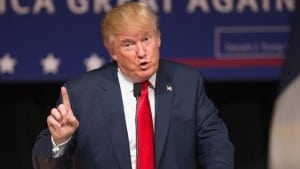
Renegotiating the Paris climate change agreement can only be done logistically if it can be done politically, which is not likely, Elliot Diringer, executive vice president of the Center for Climate and Energy Solutions (C2ES), told GHG Daily on Wednesday following comments by assumed Republican presidential candidate Donald Trump that he intends to do just that.
To renegotiate the Paris Agreement, the first real global climate accord, calling for action from both developed and developing nations, the United States would first need others that want to renegotiate. After all, you can’t negotiate if there is nobody else at the table. “I think it’s highly unlikely that other countries will want to renegotiate the agreement which is widely regarded as a high-water mark in global diplomacy,” Diringer said.
Trump has been critical of the Paris Agreement, which was adopted by 195 countries in December. The billionaire real estate mogul has said throughout his campaign that he would not have gone to Paris if he were president. In an interview with Reuters this week, Trump went one step further, claiming the plan is not fair to the U.S.
“I will be looking at that very, very seriously, and at a minimum I will be renegotiating those agreements, at a minimum. And at a maximum I may do something else,” he told the wire service.
He went on to say: “”But those agreements are one-sided agreements and they are bad for the United States,” and that he’s “Not a big fan because other countries don’t adhere to it, and China doesn’t adhere to it, and China’s spewing into the atmosphere,” he said.
China has pledged to ratify the agreement by September and played a central role in the negotiations.
While Trump’s comments quickly raised the ire of environmental groups (again), the White House quickly dismissed his plan. “I don’t know if there’s anyone losing sleep here at the White House,” spokesman Josh Earnest told reporters Wednesday.
Apart from renegotiating the agreement with the United Nations Framework Convention on Climate Change, there are actually are several ways Trump could throw a wrench in the works.
Depending on when the agreement takes effect, Trump could potentially just pull out, as nations can jump ship before the accord enters into force – which requires ratification by 55 parties representing at least 55 percent of the world’s greenhouse gas emissions.
However, once the agreement has entered into force participants are bound by language in the document itself, which features a four-year lag period before a country can pull out. “We don’t have any certainty about when it will enter into force,” Diringer said. “I’d say there’s an outside chance it would happen before President Obama leaves office, but next year looks more likely.”
Trump’s other option, if the agreement comes into force before he potentially takes office, is to simply ignore it. The agreement establishes a policy framework under which nations are to pursue nationally determined domestic actions. These actions, described in each nation’s Nationally Determined Contribution (NDC), are not legally binding, meaning Trump would not be required to do anything to meet the U.S.’s pledge to cut emissions 26-28 percent below 2005 levels by 2025.
Trump could also change the United States’ NDC, as under the agreement nations are actually required to periodically review and update their commitments, Secretary of Energy Ernest Moniz noted when questioned about the candidate’s statement during an event hosted by Politico Wednesday morning. “There is within the agreement a mechanism for revisiting [the NDC] in the sense of five-year revisits with the idea that countries hopefully, as the costs go down for technologies, will be having greater ambition going forward,” Moniz said. In fact, the agreement specifically requires that each updated NDC be more, not less, stringent than the last.
In any case, whether Trump opts out of the agreement before it comes into force, signals an intention to leave it after it has come into force, or simply decides not to act on it, there would surely be international repercussions for the U.S., Diringer said. “We’re talking shades of gray here. I mean, I think any overt statement from an incoming president that the U.S. will withdraw from, or refuse to abide by, the agreement would create diplomatic backlash,” he said.
Once the agreement is in force, the other nations that signed on would be bound to it just as the U.S., but if Washington is skirting the responsibility of pursuing its NDC, the other nations might be tempted to follow suit. “If the world’s largest historic emitter were to walk away from the agreement that might make other countries less enthusiastic in following through with their domestic implementation,” Diringer said.
An optimistic Moniz said that for several reasons he believes the Obama administration’s climate commitments will survive through future presidencies. Increased interest in clean energy innovation is driving down technology costs, Moniz said, and that trend will continue. He also noted increasingly evident effects of climate change, including more intense weather events, droughts, wildfires, and rising sea levels.
If that’s not enough to keep climate action moving, the law will, according to the energy secretary. “We have put forward as a basis of the action plan, a whole set of rulemakings, for example, in multiple sectors that have followed the stringent requirements of a rulemaking. Those are in law, and those are not arbitrarily reversed,” he said.